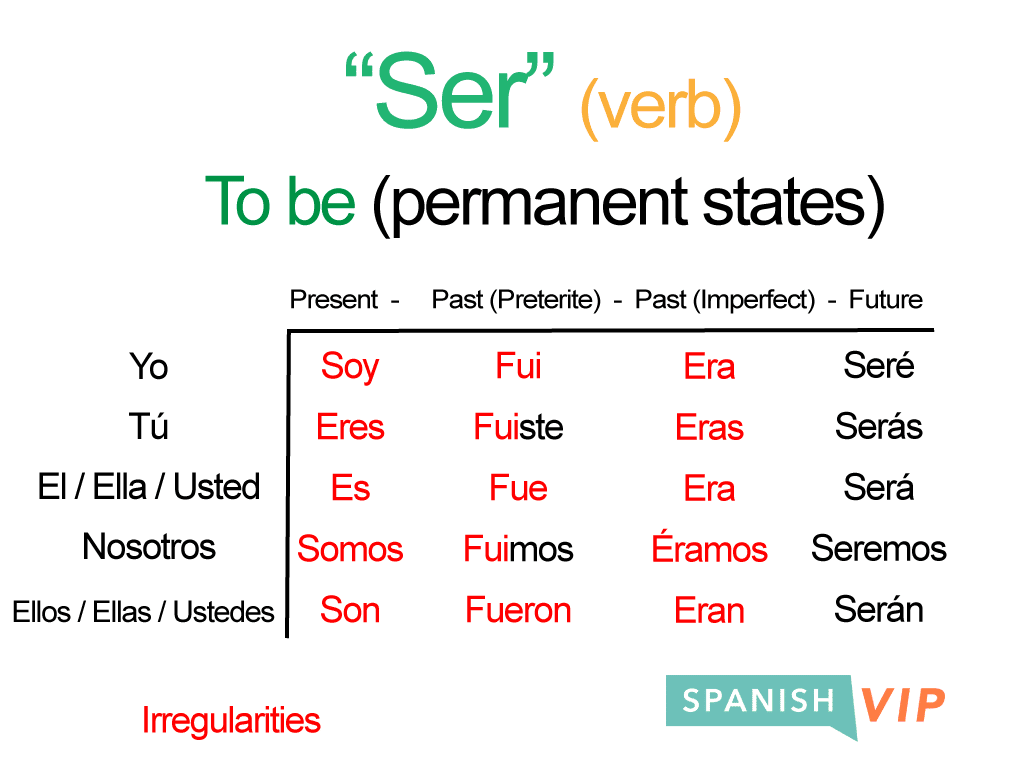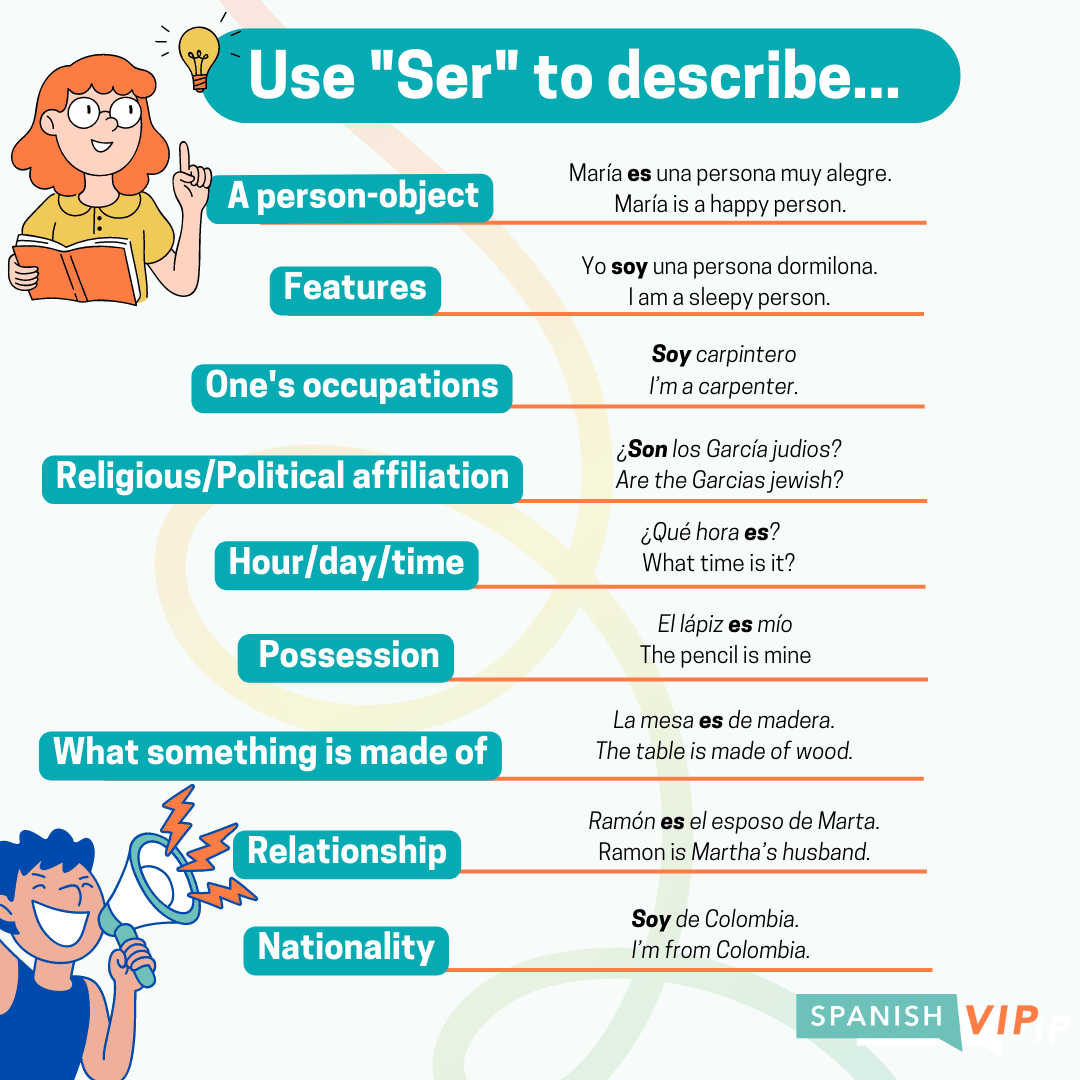If you’ve ever dipped your toes into learning Spanish, you’ve likely encountered the verb “ser.” It’s one of the most fundamental verbs in the language, used to describe identity, characteristics, origin, and more. You’ll hear it everywhere, just by watching movies, social media videos, or listening to music or a podcast.
But here’s the catch: conjugating “ser” can be a bit tricky because it’s an irregular verb, meaning it doesn’t always follow the usual patterns you might expect. This verb is used in all sorts of essential expressions, from saying where you’re from to describing who you are, so getting it right is crucial.
Whether you’re introducing yourself, talking about your profession, or simply stating the time, “ser” is your go-to verb. Let’s break down the conjugation of “ser” and make sure you have this cornerstone of Spanish mastered.

As we mentioned before, the verb ser is a highly irregular verb, and not just in the first-person singular but most of the tenses of the indicative form.
Here is the basic conjugation of the verb ser in the present tense:
| Pronoun | Spanish “Ser” present conjugation | English Equivalent |
| Yo | Soy | I am |
| Tú | Eres | You are |
| Ella / Él / Usted | Es | He/She/It is |
| Nosotras / Nosotros | Somos | We are |
| Vosotras / Vosotros | Sóis | You all are |
| Ellas / Ellos / Ustedes | Son | They are |
How And When To Use The Spanish Verb Ser
The translation of the verb “to be” can be either ser or estar, but they are not interchangeable. There’s a lot of confusion over these two verbs and when or how to use them. This is a topic we already talked about in the past, but let’s refresh your mind with when you can use the verb Ser.
The verb ser is used to express permanent conditions and describe what something is in Spanish. You can use it to:
- Describe something or someone:
Esa señora es una escritora famosa. – That lady is a famous writer.
- Refer to fundamental qualities and characteristics:
El libro es muy pequeño. – The book is very small. - Talk about nationality:
Yo soy estadounidense. – I am American.
DID YOU KNOW…?
The demonyms (gentilicios in Spanish) are the adjectives that indicate the place of birth or origin of the people, if you would like to know a demonym of any country in Spanish, search on google “Gentilicios de” followed by the country, city or place!
- Identify people’s professions or occupations:
Mi hermano es Ingeniero. – My brother is an engineer. - Address people’s religious or political identity:
Mi familia es completamente católica – My family is completely Catholic. - Communicate about time (hour, day, or date):
Son las 11 y media. – It’s half past 11. - Talk about possession:
Ese libro rojo es mío. – That red book is mine. - Describe the material something is made of:
La mesa es de madera.- The table is made of wood. - Know the relationship between one person and another:
Mariana y Pamela son muy buenas amigas. – Mariana and Pamela are very good friends.

The Complete Guide to Ser Conjugation
Indicative Conjugation of Ser
The indicative mood is the one most commonly used in Spanish. In the first three tenses, the ser conjugations are completely irregular, while the conditional and future conjugations follow the regular rules:
| Subject | Present | Preterite | Imperfect | Future | Conditional |
| Yo | Soy | Fui | Era | Seré | Sería |
| Tú | Eres | Fuiste | Eras | Serás | Serías |
| Él, Ella, Usted | Es | Fue | Era | Será | Sería |
| Nosotros | Somos | Fuimos | Éramos | Seremos | Seríamos |
| Ellos, Ellas, Ustedes | Son | Fueron | Eran | Serán | Serían |
QUICK NOTE…
Wait, but the verb Ir in the preterite tense is the same as the verb ser in the preterite tense! How come!?
As you might or not notice, the verbs ir and ser have identical conjugation in the preterite tense. You’ll have to rely on context to tell which verb is being used.
Though, it is pretty easy to tell the difference between the two verbs. For one thing, ir is usually followed by the preposition a (to), since you usually go ‘to’ somewhere.
Let’s take a look at the following sentences and explain the difference:
- Yo fui a la tienda el martes por la tarde. – I went to the store on Tuesday night.
(Since we know that there’s the preposition “a”, we can know that the verb used is ir)- La clase fue muy entretenida. – The class was fun.
(Since the context talks more about the class performance, we can say that the verb used is ser)
For example:
Yo soy un abogado. – I am a lawyer.
¿Tu fuiste la cocinera de ese restaurant? – Were you the cook at that restaurant?
- Imperfect tense:
El era un gran amigo mio. – He was a great friend of mine.
Nosotros seremos los mejores jugadores de fútbol! – We will be the best soccer players!
Ellos serían Colombianos si nacen en Colombia. – They would be Colombian if they were born in Colombia.
Indicative Compound Ser Conjugation in Spanish
Compound tenses are those expressed using two verbs: one auxiliary followed by the main verb. In Spanish, we call them tiempos verbales compuestos (compound verbal tenses).
A compound tense in Spanish always uses one auxiliary verb. This verb is Haber, which follows the same rule as have/has in English.
| Subject | Perfect Tense | Pluperfect Tense | Preterite Perfect Tense | Future Perfect Tense | Conditional Perfect Tense |
| Yo | He sido | Había sido | Hube sido | Habré sido | Habría sido |
| Tú | Has sido | Habías sido | Hubiste sido | Habrás sido | Habrías sido |
| Él, Ella, Usted | Ha sido | Había sido | Hubo sido | Habrá sido | Habría sido |
| Nosotros | Hemos sido | Habíamos sido | Hubimos sido | Habremos sido | Habríamos sido |
| Ellos, Ellas, Ustedes | Han sido | Habían sido | Hubieron sido | Habrán sido | Habrían sido |
For example:
Yo siempre he sido el mejor de la clase. – I have always been the best in class.
En el pasado, tú habías sido un buen carpintero. – In the past, you had been a good carpenter.
- Preterite perfect tense
Tan pronto hubimos sido pillados, empezamos a correr – As soon as we were caught, we started running
- Future Perfect tense
Para el año 2025, ella habrá sido la mejor entrenadora del mundo! – By the year 2025, she will have been the best trainer in the world.
- Conditional perfect tense
Si hubiese ido a la academia militar, no habría sido un artista. – If I had gone to the military academy, I would not have been an artist.
Ser Conjugation: Subjunctive Mood
The Spanish subjunctive mood is used to give opinions, talk about hypothetical situations or indicate politeness. There are two versions of the Imperfect tense that can be interchangeable.
| Subject | Present | Imperfect 1 | Imperfect 2 | Future |
| Yo | sea | fuera | fuese | fuere |
| Tú | seas | fueras | fueses | fueres |
| Él, Ella, Usted | sea | fuera | fuese | fuere |
| Nosotros | seamos | fuéramos | fuésemos | fuéremos |
| Ellos, Ellas, Ustedes | sean | fueran | fuesen | fueren |
For example:
¡Que seas feliz! – Be happy!
Ella no cree que tu fueras un atleta profesional. – She doesn’t think you were a professional athlete.
- Future Subjunctive:
Yo siempre tuve fe en que ustedes fueren novios algún día. – I always had faith that you will be a couple one day.
Compound Tenses Of The Subjunctive
The Spanish subjunctive mood is expressed in two compound tenses: the present perfect tense (pretérito perfecto) and the past perfect (pluscuamperfecto). There’s also the future perfect (Futuro perfecto), but it’s no longer used.
| Subject | Present Perfect Tense | Past Perfect |
| Yo | Haya Sido | Hubiera / Hubiese Sido |
| Tú | Hayas Sido | Hubieras / Hubieses Sido |
| Él, Ella, Usted | Haya Sido | Hubiera / Hubiese Sido |
| Nosotros | Hayamos Sido | Hubiéramos / Hubiésemos Sido |
| Ellos, Ellas, Ustedes | Hayan Sido | Hubieran / Hubiesen Sido |
For example:
- Present perfect tense:
Espero que tú hayas sido seleccionado para esa promoción que tanto quieres! – I hope you have been selected for that promotion!
- Past perfect tense:
Yo dudaba que él hubiera sido famoso. – I doubted he would have been famous.
Ser Conjugation: Imperative Mood
The imperative mood is used to give commands. For these tenses, you don’t include the “Yo” or the “El/Ella/Eso” personal pronouns for obvious reasons, you can’t give an order to yourself!
| Subject | Affirmative | Negative |
| Tú | Sé | No Seas |
| Usted | Sea | No Sea |
| Nosotros | Seamos | No Seamos |
| Ustedes | Sean | No Sean |
For example:
- Affirmative example:
¡Sé mejor que yo! – Be better than me
- Negative example:
¡No sean personas flojas! – Don’t be lazy people!
Don’t be scared
We hope that this article was helpful to you in any shape or form. If you really liked it, why don’t you consider having a one-on-one Spanish teaching session with us and practicing what you learned?
If you think that learning Spanish grammar alone is too difficult for you, SpanishVIP is here to help. Sign up for a free Spanish lesson or a 7-day free trial of our group classes and practice what you learned. It’s a completely free, no-questions-asked trial!
Want to learn Spanish, fast?
Download our e-book, Easy Spanish Shortcuts, and learn your first 1,000 Spanish words in under a day!




